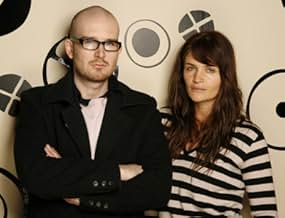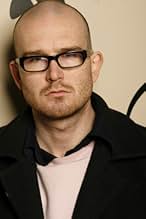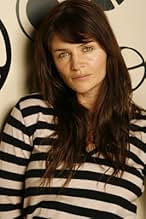Famous pianist Zetterström returns home to his native Denmark, to give a concert, just to find out that the choices he has made in his life have affected his love life greatly.Famous pianist Zetterström returns home to his native Denmark, to give a concert, just to find out that the choices he has made in his life have affected his love life greatly.Famous pianist Zetterström returns home to his native Denmark, to give a concert, just to find out that the choices he has made in his life have affected his love life greatly.
- Director
- Writers
- Stars
- Awards
- 1 win & 6 nominations total
Peder Thomas Pedersen
- Guard 1
- (as Peder Pedersen)
Susanne Storm
- Mor Til Dreng
- (as Susanne Storme)
- Director
- Writers
- All cast & crew
- Production, box office & more at IMDbPro
Featured reviews
The Danish film, "Allegro," is that rare science fiction film that uses only the barest minimum of special effects to tell its story (a slight wrinkle in the picture is about as high tech as the filmmakers are willing to go). Instead, the fantasy and surrealism play out almost exclusively in that far more intriguing venue known as the Theater of the Mind.
Zetterstrom (well played by Ulrich Thomsen, who appeared in the excellent "Brothers" a few years back) is a concert pianist who has never been able to find true happiness in his life, even after he's met and formed a relationship with Andrea (Helena Christensen), the supposed woman of his dreams. Zetterstrom may be a brilliant musician, but he suffers from an innate distrust of other people, including those who are nearest and dearest to him. When Andrea decides to up and leave him virtually without warning, Zetterstrom imposes a form of amnesia on himself that effectively wipes out all memory of his life prior to her departure. At the same time - and this is where things really get strange - the section of Copenhagen where he was born and raised undergoes a bizarre transformation, suddenly becoming cut off from the rest of the world by some inexplicable supernatural force. Though no one can physically enter this area - now officially re-named The Zone - Zetterstrom is determined to force his way in, when, after ten years of not being able to recall his past, he begins to suspect that his memories may actually be residing in that mysterious place.
Needless to say, this is not your average science fiction movie, nor is it your average tale of lost love. But by combining these two usually distinct genres into a single story, director and co-writer (with Mikael Wulff) Christopher Boe has come up with a work that is both thought-provoking and haunting in its otherworldly strangeness. Zetterstrom wanders through the maze of this "pseudo" city like one in a trance or a dream, searching for clues to his forgotten past and trying to figure out the identity of the strange woman (Andrea) who flits in and out of the shadows of his imagination.
The message of this strange little parable seems to be that even the most tragic events of our lives make up a crucial part of who we are - and that any effort to dull the pain of those events by tucking them away in a corner far out of reach of our memory only winds up diminishing us as a person in the end. Zetterstrom learns that lesson the hard way, but at least he does learn it. It reflects well on the filmmakers that they've presented their case in as uniquely fanciful and absorbing a way as they have in "Allegro."
Zetterstrom (well played by Ulrich Thomsen, who appeared in the excellent "Brothers" a few years back) is a concert pianist who has never been able to find true happiness in his life, even after he's met and formed a relationship with Andrea (Helena Christensen), the supposed woman of his dreams. Zetterstrom may be a brilliant musician, but he suffers from an innate distrust of other people, including those who are nearest and dearest to him. When Andrea decides to up and leave him virtually without warning, Zetterstrom imposes a form of amnesia on himself that effectively wipes out all memory of his life prior to her departure. At the same time - and this is where things really get strange - the section of Copenhagen where he was born and raised undergoes a bizarre transformation, suddenly becoming cut off from the rest of the world by some inexplicable supernatural force. Though no one can physically enter this area - now officially re-named The Zone - Zetterstrom is determined to force his way in, when, after ten years of not being able to recall his past, he begins to suspect that his memories may actually be residing in that mysterious place.
Needless to say, this is not your average science fiction movie, nor is it your average tale of lost love. But by combining these two usually distinct genres into a single story, director and co-writer (with Mikael Wulff) Christopher Boe has come up with a work that is both thought-provoking and haunting in its otherworldly strangeness. Zetterstrom wanders through the maze of this "pseudo" city like one in a trance or a dream, searching for clues to his forgotten past and trying to figure out the identity of the strange woman (Andrea) who flits in and out of the shadows of his imagination.
The message of this strange little parable seems to be that even the most tragic events of our lives make up a crucial part of who we are - and that any effort to dull the pain of those events by tucking them away in a corner far out of reach of our memory only winds up diminishing us as a person in the end. Zetterstrom learns that lesson the hard way, but at least he does learn it. It reflects well on the filmmakers that they've presented their case in as uniquely fanciful and absorbing a way as they have in "Allegro."
I went out from the cinema crying. The movie, as all movies in my opinion, removes inside you what you let be removed... I am only 28, and yet, this movie reminds me of how many memories I want to hide, forget, just because my life is based on "keep on living, keep on acting as you decided, don't turn back, because this is imperfection". I don't think the movie is excellent, but it has a specific message (art is made of passion and passion is made of each one's history) and it knew how to express it, how to deal with this psychological side each one of us has. Also the music, mainly J.S. Bach, is beautiful. This is the kind of movie that I would call "of the moment", maybe you won't remember it in a few months, but it inspires you and lives with you unconsciously as a psycho therapy does.
I just had the chance to check out this excellent Danish film from 2005 that is just now being screened in our area, after a two year wait (better late than never). Allegro is a dreamy allegory about a (somewhat) eccentric concert pianist who left his home country after a failed romance, only to return there after receiving word via post card that his memories have been kidnapped and are being held in a metaphorical area called "the zone" in Copenhagen. What results is the pianist trying to come to terms with his past. The bravura cast is made up of Danish actors,who I had never heard of before,as was their director/co-writer,Christopher Boe. Without revealing too much more, I would have to say that Boe's style of directing reminded me if Jean Cocteau returned from the dead, and had the chance of directing one more film, and opted to make that film for DOGME productions, it would look a whole lot like Allegro (it has that DOGME look, i.e. a grainy, kitchen sink,almost home movie kind of look,which is what I always admire about DOGME---what ever happened to DOGME productions,anyway?). This film will entrance some, while others will scratch their heads and say "what the hell is this all about?". What I also admired was the fact that the film is not just all seriousness. It has a sense of humour,too. You may have to do a bit of searching around to find this little understated gem (it's probably best seen on a theatrical screen, proper--but DVD will work, too), but will be well worth seeking out.
There's a fine and potentially powerful sci-fi-as-metaphor idea at the heart of this film: the notion that the painful memories you wish to repress might be actually taken from you and placed somewhere ("The Zone," a la Tarkovsky's Stalker).
The trouble is, the film is not told from the point of view of the protagonist. His emotional journey would have been powerful if the audience had been *asked to share it.* Why can't I remember more than ten years back? What happened ten years ago? What connection, if any, does my memory lapse have with the mysterious region in my former home city called "The Zone"? Who is the woman in this picture: might she be a lover I have somehow forgotten? Unfortunately, while all of these things are puzzling to our hero, the answers have already been spelled out for us, because the story has been told in a linear fashion, and is actually narrated by an omniscient voice who explains everything point-by-point, essentially before it has happened. This greatly reduces the movie's emotional impact: we are now a passive observer rather than an active participant.
It is, in other words, the anti-Memento. I've long been championing the artistic cause of puzzle movies like that one, and Donnie Darko, Eternal Sunshine, and Upstream Color ... because real life is a puzzle that lacks an omniscient narrator. I wish Boe had trusted his audience much more and dared to tell this from the proper POV: that, and better casting of the female lead, would have made this an 8/10. As it is, it is worth seeing more as an argument in favor of more challenging narrative structures.
The trouble is, the film is not told from the point of view of the protagonist. His emotional journey would have been powerful if the audience had been *asked to share it.* Why can't I remember more than ten years back? What happened ten years ago? What connection, if any, does my memory lapse have with the mysterious region in my former home city called "The Zone"? Who is the woman in this picture: might she be a lover I have somehow forgotten? Unfortunately, while all of these things are puzzling to our hero, the answers have already been spelled out for us, because the story has been told in a linear fashion, and is actually narrated by an omniscient voice who explains everything point-by-point, essentially before it has happened. This greatly reduces the movie's emotional impact: we are now a passive observer rather than an active participant.
It is, in other words, the anti-Memento. I've long been championing the artistic cause of puzzle movies like that one, and Donnie Darko, Eternal Sunshine, and Upstream Color ... because real life is a puzzle that lacks an omniscient narrator. I wish Boe had trusted his audience much more and dared to tell this from the proper POV: that, and better casting of the female lead, would have made this an 8/10. As it is, it is worth seeing more as an argument in favor of more challenging narrative structures.
I don't understand how the previous reviewer could accuse this film of trying to be too mysterious and of being "overexplained"--these seem inconsistent to me. For my part, I found it straightforward and a bit didactic but I do think the psychological phenomena it pointed to are worth thinking about. Those who remember "Reconstruction" will find this exercise similar in style but less ambitious. It does have its flaws--for example, the devices used to attempt to generate suspense are not very effective. I would say this film succeeds more at getting those in the audience who are attuned to the questions it raises thinking than it does as pure entertainment.
Did you know
- Quotes
Zetterstrøm: - But what now... now that I regret?
Tom: - It's a bit late for that, I am afraid.
Zetterstrøm: - So, what do I do now?
Tom: - Well, you can go back to your music, if you want.
- ConnectionsReferenced in iChat mellem Boe og Wulff (2006)
Details
Box office
- Budget
- DKK 10,000,000 (estimated)
- Gross US & Canada
- $7,404
- Opening weekend US & Canada
- $505
- May 13, 2007
- Gross worldwide
- $10,208
- Runtime
- 1h 28m(88 min)
- Color
- Sound mix
- Aspect ratio
- 2.35 : 1
Contribute to this page
Suggest an edit or add missing content






























